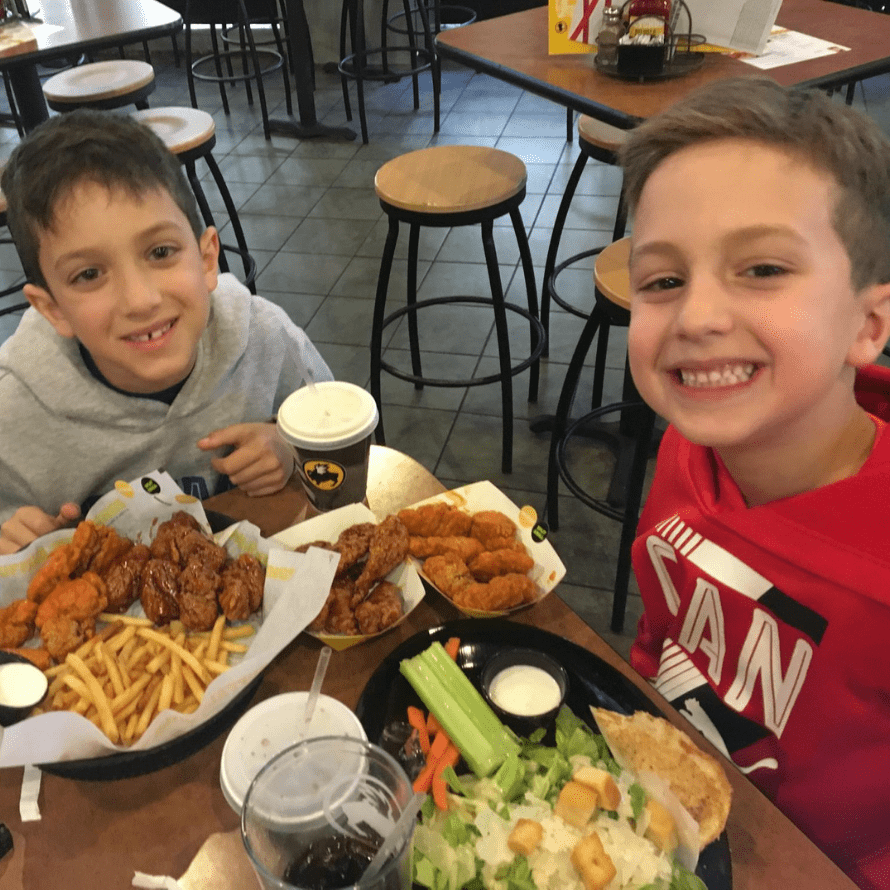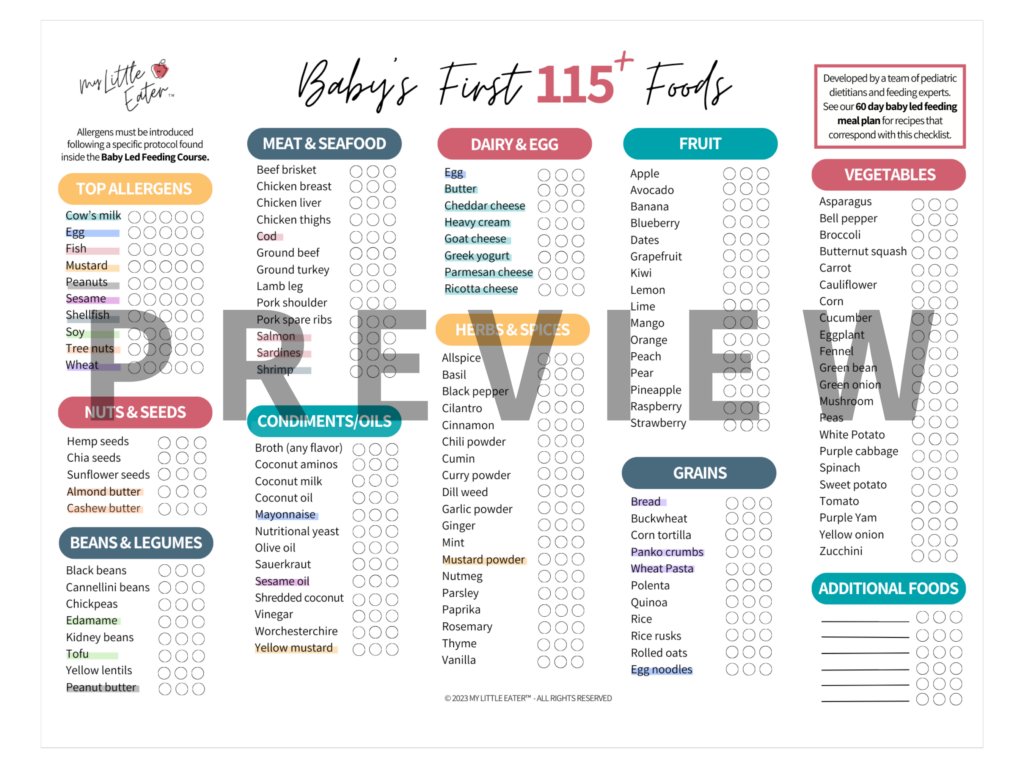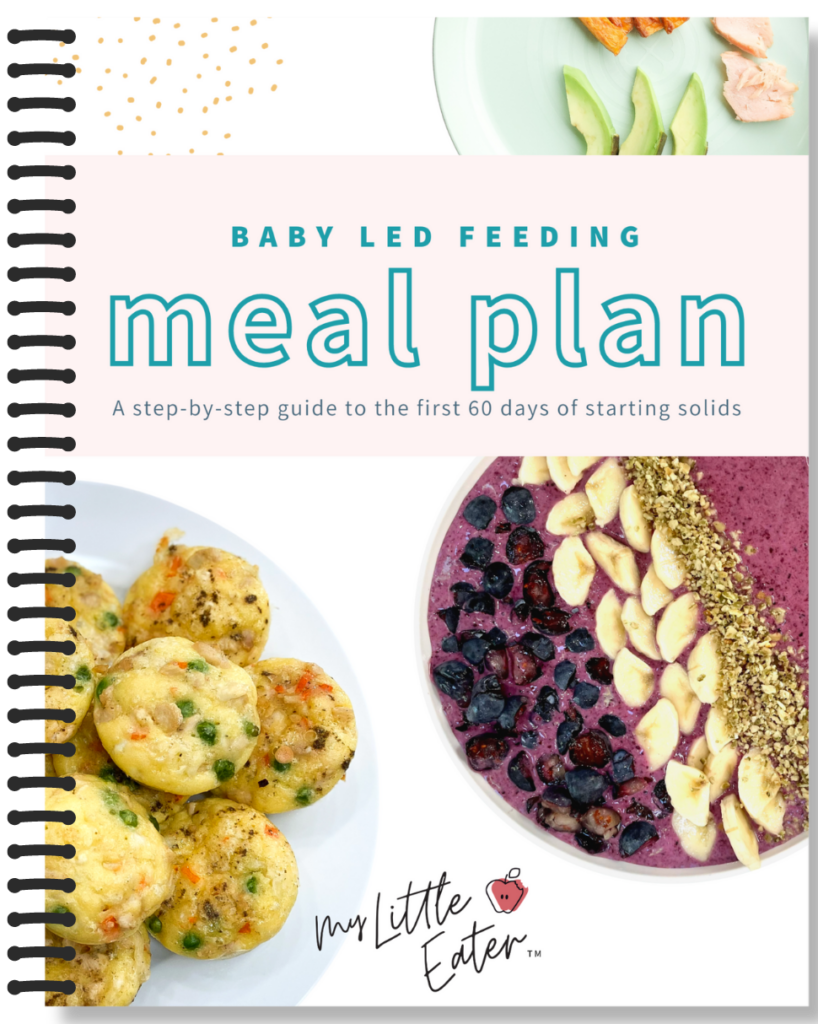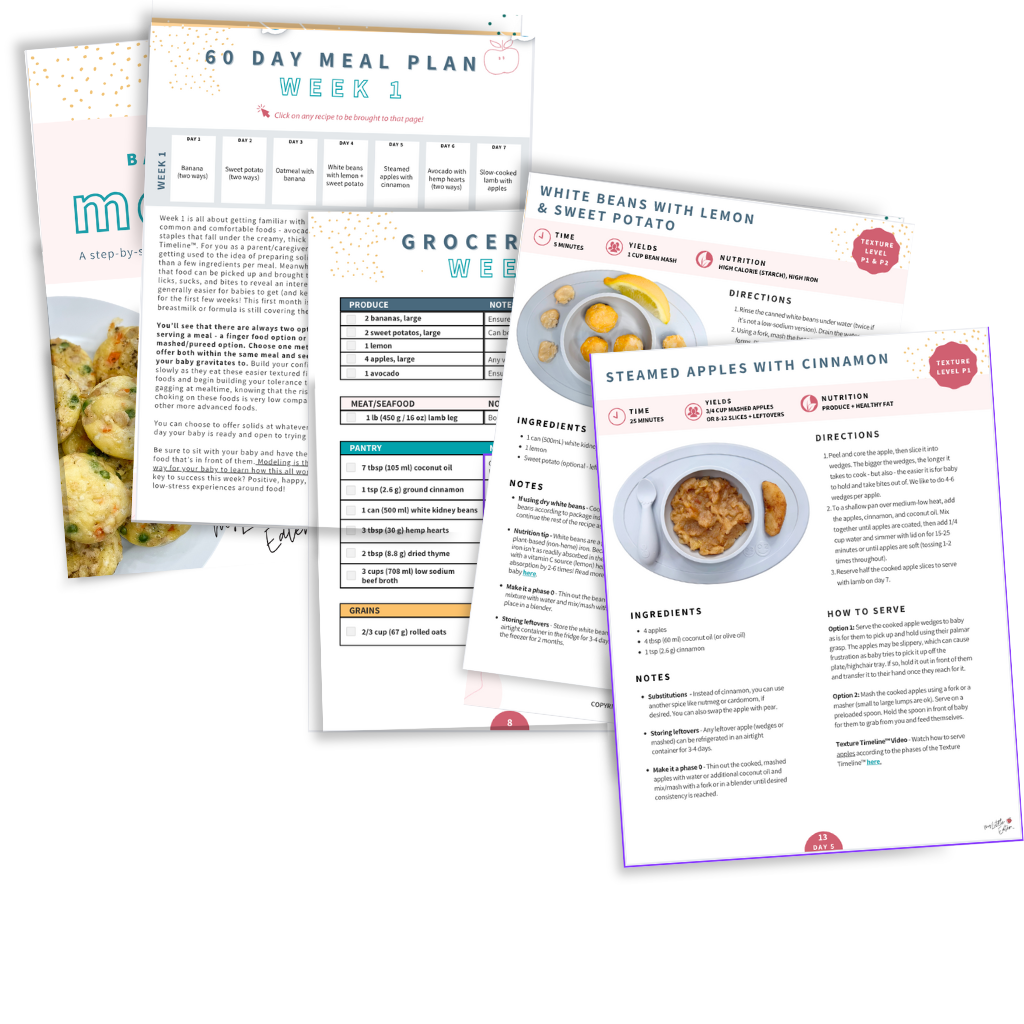
In honour of Father’s Day coming up this weekend, I decided to interview my husband, Jimmy Kennedy, to get his opinion on sharing roles when it comes to parenting and feeding kids, as well as what he really thinks of my feeding approaches!
Typically, I see families that have one parent that has taken on the majority of the responsibility when it comes to feeding their kids, and more often than not it’s usually Moms that I’m interacting with. Now, there’s obviously no rule around this, and that’s not to say that Dads can’t be, or aren’t, the ones taking on the responsibility for this – every house is different. But I find that because oftentimes moms begin taking on that role of feeding right from birth, could be by starting with breastfeeding, that tends to carry on until they begin solids. I often see more moms that are on maternity leave as well. So they’re the ones at home with their babies for those first meals, and often are present for more meals in general, and then therefore take on a larger role – this is why literally 99% of my audience is moms. Dads definitely have a role in these cases, but it may look different. Like in my house, it tends to be more of the fun role, or the role of the parent that “breaks” some of the rules around feeding.
However, I’m beginning to see a bit of a shift – and I love it! With the dawn of online courses, like my Baby Led Feeding and Feeding Toddlers courses, it has become so much easier for parents to take courses on feeding together. As a result, I’m getting more messages from Dads looking for help with feeding. In these cases, we’re seeing Dads that have done all the research, they know the philosophies, and they’re struggling because their wife is simply not on board at all. They have opposing philosophies, and often there’s a lot of conflict or stress as a result. So I’m planning on focusing on this a lot more in future so that we can provide support to these Dads in an otherwise mom-dominated space.
To start, I wanted to chat with my husband about how feeding responsibilities are broken up in our house, what he feels contributed to our boys being adventurous eaters and independent in the kitchen, and how he feels about some of my “rules”. He provided a lot of really great tips for parents, and specifically for Dads who want to take a more active role in feeding but aren’t really sure where to begin. If you’d like to listen to the full episode, download it here so it’s ready for the next nap time!
Meet my husband, Jimmy Kennedy:
Jimmy loves a good joke, so unsurprisingly, he started the episode by saying: “I carry the load for most of the family when it comes to food preparation, feeding our kids, along with their physical literacy.” (We chat about how it’s really split up in a little bit!)
He works in real estate, both on commercial property management and residential development. He’s been doing that for about 12 years, with our company called Valour Investments.
Jimmy does take on some of the cooking in our house, and his favourite meal to cook is definitely breakfast. He feels that is common with a lot of fathers, there’s definitely something about waking up, particularly on the weekends, cooking a big breakfast and having the whole family in the kitchen. Him and the boys are really into soccer, so they usually wake up (let me sleep in!), have a big breakfast, put on some soccer and dial into some family time on Saturdays and Sundays.
How we share cooking responsibilities:
How we really break down the cooking roles in our house is that he probably cooks more on the weekends, and definitely cooks more breakfasts, but weekday cooking is more my role, and I take the lead on that. And I’m very grateful for how he does take on that role on the weekends, especially since it lets me sleep in! I think that in terms of planning suppers, and just figuring out what we’re going to have, and getting groceries, basically our meal plan in general, that definitely falls on me.
So basically he gets the fun meals, and I cook the mandatory, or healthier meals throughout the week. We each have areas that we do things really well in, and so I wanted to know what he feels are his strengths when it comes to feeding our kids, vs. my strengths.
He 100% takes on the BBQ responsibility – which I did credit him for in an episode last week on BBQ safety for babies! Therefore, a lot of the summer meals, and anytime we’re eating outside or barbecuing, that’s his job or responsibility, which he says he enjoys anyway. But as far as feeding the kids go, he says they’ll always call or text or ask him first for snacks before they ask me. Which he can understand why, he’s probably a little looser when it comes to allowing them to have treats and that sort of thing. So, he describes it as having a more casual relationship with the boys and food. Whereas I focus a lot more on healthy meals, making sure they have the right nutrients for when they play soccer, or just in general. He’s not as deliberate about what they eat, or when they eat.
At this point, I have to definitely call him out, because I really agree with what he said there. When the boys were younger, I can remember being out of the house over lunchtime or something like that, and I’d come home and ask if they even ate anything. And my husband would say something like “No, I wasn’t hungry.” And I’d have to ask him, “But what about the kids?”. So he didn’t really think about their schedule, and what may be an appropriate time for them to be eating – that definitely falls more on me to do.
Now that they’re older, my husband makes a good point in that they know how to fry an egg or something if they’re hungry. Which is true, they can do that. And that really leads into what I wanted to know next. I have my ideas on things that I think helped our boys become more independent in the kitchen, but I was curious to know what my husband thinks really contributed to that. We get comments all the time wondering how we did that, and what our secret is, so it’s time to reveal our ways!
How we got our kids to be so independent in the kitchen:
In his opinion, there’s really two things that helped our boys become so independent in the kitchen. The first is that they emulate our behavior, and because they’re boys, he thinks they emulate his behavior a little more than mine. So when they’re used to coming down and seeing him in the kitchen, cooking breakfast and just cooking meals in general, they may see it as a cool thing to do, or as a step to independence and being grown up.
And the second part of it is that when we are in a kitchen as a family we make it a fun experience. So there’s music playing, we have drinks, everyone is participating. We plan out our meal, get all of the ingredients out, and cook together. It’s a little bit more ceremonial, and almost an event. So he thinks, and I completely agree, that they think fondly about their time spent in the kitchen rather than it being like “Oh God, we have to go cook now”, and making a chore out of it.
I have to add too that especially when COVID started, we started having, every single Friday night, a family cooking night. We’d plan our menu, get what we needed from the grocery store, and just get really excited about it. Then on Fridays we’d get in the kitchen, put on music, and basically have a full family night. And so it was relaxed. We weren’t really rushed, it wasn’t something we had to do. It was something that the boys looked forward to, and they’d always ask “What are we going to cook?”, so it was fun for everybody.
We also started watching cooking shows together. I think this was another thing that helped. We really got into Chopped, and some baking shows. So that really increased their love and interest in food. We’d talk about the different techniques, who was doing something better, and that kind of thing made it a bit of a competition. So I think that also has a lot to do with how they are today.
Now to expand on this more, I wanted to know what he thinks some of the things are that contributed to how adventurous our kids are with eating. So not necessarily with cooking, but their willingness to try new foods, eat a variety of foods, go out to nice restaurants…things like that.
How we got our boys to be adventurous eaters:
Jimmy chose to pay me a compliment here, because when they were really young, I was more the one that would help them to taste new things, to try something to see if they liked it, etc. Now I will clarify that my boys never felt pressured to try anything, they knew that if they did try it and didn’t like it there was no pressure to eat it. But he says that he feels that really allowed them to adapt to doing that. So anytime that we travel, or go out to eat, they’d be willing to do that. And we also never expected them to eat off the kids menu. Like we never just assumed they’d have chicken fingers, or a hamburger, or something like that. We’d allow them to choose whatever they wanted off the menu…the full menu.
Initially, he thinks this probably seemed like such a grown up thing to be able to do. But as a result of letting them do this, they’ve been adventurous ever since. For example, I know we were giving them sushi from early ages, and we just never assumed that they wouldn’t like something. If we were going out to eat, no matter what it was, whatever we were eating, they would have too.
My husband also went on to say how they never really complained about different tastes, or anything like that. He can even remember our youngest coming up and saying something about how his taste buds change so he’d like to try something because maybe he likes it now. Which leads me to a top tip!
Top Tip About Taste Buds!
One thing I would always do with the boys, especially if they said they didn’t like something, was I’d always tell them that was fine. But I’d also explain to them that even though they didn’t like it last time, their taste buds change all the time. We’re always growing and developing new taste buds, so just because we didn’t like something the last time we tried it, we might have new taste buds now, and those taste buds might like it. So I’d ask them if they’d like to see if their new taste buds made a difference in whether they liked something or not.
And they know I never pressured them, so if they chose to take a bite, if they still didn’t like it, then I’d say something like “Oh well, I guess they’re still the same!”. But this really got them tasting it every single time, and a lot of that was just out of curiosity I think. It was about testing to see if their taste buds had changed, and more often than not, it got them to be eating it and then even liking it.
Jimmy’s views on my approach to feeding:
Now it was time to find out what Jimmy really thinks of my approach to feeding. I wanted to know what he loved about it, and what he thought was maybe a little overboard.
He starts by explaining that he didn’t really grow up in a household that was particularly focused on nutrition, or that was well-educated on the topic. So because of my career, and my expertise on it, I come at the topic of feeding from a very different angle than he does.
His example of this is about what he calls “The war on juice”. Which in my eyes is a treat food, which is something that I’m trying to get him to see as well. But, in his opinion, it needs to end. When he was a kid, having a glass of juice was considered the healthy option, it was better than drinking a pop, right? So that’s part of it. But his other point of view on this is that he always tries to weigh the type of food they’re eating against how active they are. And they’re very active boys. So he doesn’t necessarily factor in the nutrition of every bite, or meal. For example, if they ate several pastas in a row or something, that wouldn’t register to him as being inappropriate.
So here’s where I had to interject because I found this funny. I realized that apart from maybe having different approaches when it comes to feeding, we actually have different ideas on what my approach even is when it comes to feeding. So it seems that in his opinion, I’m focusing more on them not having too many carbs, or something like that, using his example of multiple pasta dishes. But in reality, that’s not it at all. My concern is about having a balanced plate, which if you’ve been around here for a bit you’ve probably heard me talk about. So, if you’re having pasta, are you also having some form of protein, is there a vegetable on the plate? That sort of thing.
So one of the things that I notice as being a big difference between him and I is that when we cook for the kids, I’m generally thinking about all of the components, and definitely always serving a vegetable at every meal. But with him, his focus tends to be more on protein and carbs, so ensuring there’s rice, or a potato, or something like that. But when it comes to vegetables, it’s maybe more of a small thing, like chopped onions or diced tomatoes. Which there’s nothing wrong with, but it doesn’t really make up a full vegetable side, per say.
And to clarify, there are definitely benefits to both approaches. I see lots of benefits when it comes to having him in the kitchen, and his style of doing things. And then there’s also benefits to when I’m the one in the kitchen, and striving for that balance that I’m looking for for them. He describes it as me being more willing to play the long-game with food. So I’ll serve them something that I know they may not be particularly keen on, in the moment, but I know that over time they’ll get used to it. Whereas when he’s putting something on the plate, he’s thinking short-term, and just wants to make sure that they have sustenance and will be full after.
And I think this is incredibly common among the parents I work with! Many of the parents that are new to my strategies, and are just getting started with some of my approaches, are definitely concerned about their child being hungry if they don’t eat what is served. So I want you to know that I completely understand these concerns!
Another example of this is that my husband may ask our boys what they want on their pizza, but I will think something like, “Oh they haven’t had mushrooms in a while, I’m putting those on”. I may be more focused on making sure they’re getting that exposure if it has been some time since they’ve eaten something.
All of this led me into my next question about whether my husband feels it’s possible for both partners, who disagree with each other’s feeding approaches, to find some balance and ultimately have an equal role in feeding.
Is it possible to find balance in feeding approaches as partners?
When I think about this, I’m picturing two people who are very polarized in their opinions. So for example, one person who makes their child take a bite, doesn’t let them leave the table unless they’ve finished their plate, or something like that. Whereas the other person is more where I am, and prefers to use my approaches to feeding, they follow the division of responsibility, etc. I was wondering if he thought it was possible for these two people to find common ground, and I was also curious to know if my husband would have any advice given the difference in our approaches (although not quite this extreme).
He thinks that in any situation in parenting, if there’s a philosophical difference in how something should be handled, it’s time to bring in the experts (not a plug, I swear he said this voluntarily!). There’s always people you can reach out to with resources, and he finds this true for all aspects of our lives, and for his business. If the two people are both anchored in their opinions, and feel very strongly about something as important as your child’s nutrition, then it’s time to find out who your best resource is that you can consult. Try to consume as much educated, or informed, material as you can, and explain why you each believe your own two sides, and see if there’s a way for you to meet in the middle that will make sense for each of you.
Alternatively, he suggests trying one person’s approach for a while, and then switching to the other to see how they go, or what kind of reactions you get. So for example, in the case of sitting down to eat and needing to eat every bite, try that for a period of time, and then switch to the division of responsibility. Try it for the same amount of time, and compare the reactions.
Advice for new Dads:
Now, for all those new Dads out there, I wanted to get some advice from Jimmy for them – how can they become more involved in feeding their kids? What’s the best way to go about it if their partner usually takes over that role?
Once again he jokes at first by saying: “I think that most McDonald’s have drive-thrus. You just jump in the car, and say you gotta run some errands, right? Throw the kids in the back and you’re all set.” But in all seriousness, he thinks that setting a long-term goal is important, but then also breaking that goal down into a few steps so that it’s manageable. He says, “You’re not going to convert me right away, day one, by saying this is how we’re doing a complete 180 on our feeding process. But if you said, you know, for the next three weeks, I want to make sure there’s a vegetable as a side for every dish, and then following that we’re going to try to bring it down to one treat a day, and so on and so forth.” This allows you to do things gradually. If you make any substantial changes, and it seems like it’s coming all at once, it’s too daunting to take on. It’s hard to carry your momentum.
I think that’s also really great advice, maybe sometimes easier said than done, but I think that approach has really helped me to communicate the info that I want to share as well. I’m usually the one throwing a lot of info at him, by saying we need to do this and this and this. But, I’ve learned to just send him a list, and to really break it down into baby steps, especially when it’s something that is different to his approach. I need to make sure it’s more of a gradual change to get him on board.
So, if you were looking for your partner to come in, take on a bigger role, help out, etc. It’s probably wiser to assign maybe one little, tiny thing for them to start with, then to provide them with a list of all the changes at once. And my husband brings up a good point in that with a smaller step that you both agree on, you can then start to see success. And like anything else in life, once someone starts experiencing success, they’re going to be more engaged, more enthusiastic, and want to maintain that momentum. So as opposed to just trying a hundred things at once, and it being overwhelming, start celebrating small wins and then carry on from there.
Jimmy’s opinion on how I handle “treat” foods:
So truthfully, I’m always on him and the boys about limiting treat foods, and I probably consider more things to be treat foods than they do, so I wanted to know how he feels about that particular philosophy when it comes to feeding the boys.
He thinks it’s tough. The kids obviously want treats, he obviously wants treats, so it’s a challenge. He says if there are good options in the house, they have easy access to it, then it’s a lot simpler. But when they look in the fridge and there aren’t many options, it’s harder. And I don’t know about you all, but my husband will look in the fridge, which is packed full, and tell me there isn’t anything to eat because it’s only ingredients (which I find pretty funny!). It would be so nice to have things that are ready-made, I totally get that, but we definitely have different opinions on this because I’ll see the options available, and sometimes he’s looking more so for an easy, snack-type food.
An example of something they’d grab if it’s available, as more of a healthy option to typical snack foods, would be plantain chips and guacamole. So if they open the fridge and see yesterday’s lasagna and zucchini noodles, and stuff like that, then it’s a lot less appealing, and more difficult not having those “treat” foods available.
How upbringing influences how you parent at mealtimes:
This is another interesting topic for me, I do feel like often we have things that we experience as children that affect how we choose to parent. For my husband, I wanted to know if there was anything from how he was raised that contributed to the way he feeds our kids, or that may influence his opinion on what he deems important at mealtimes.
In his family, table manners were hugely, hugely important. For example, you’d be asked to leave the table if you weren’t eating your food politely, which he still puts on our kids, it’s still a rule in our house, because he feels that it’s very important. Another one for him was how you showed respect for the person who cooked the meal. And in his house, that meant finishing all your food. His Dad’s opinion was that if his Mom had gone to the trouble to cook something for them, then they should take the trouble to eat it, whether they liked it or not, whether they were full or not. He talks about how they’d be sitting at the table for hours in this kind of standoff, wondering whether his Dad was going to cave, or if they would have to finish their plate. There wasn’t necessarily a focus on portion size or anything like that. It was simply about showing respect by eating your food and keeping your mouth shut – basically. And he still sees some value in that.
Which I was very curious about because he certainly isn’t like that with our boys. So I wanted to know if he looks back on that and is in shock at how things were, or what his opinion on it is now looking back. And to a certain extent he says: “Hypothetically, in some crazy circumstance where it’s you that cooks the meal, and it’s not their favorite meal, and they’re saying, ‘I don’t want this. I want that.’ I think, yeah, suck it up and eat your dinner and stop complaining. Not every meal is gonna be pizza.” And, I mean, I truthfully may think the same thing, but definitely say it differently in my head! And it’s not really something that I associate with lack of respect for me.
I do really think table manners are very important. And I think that just being courteous and kind is very important, but you know, when we were kids it was whatever food’s available, you’re going to eat it. And for him, worrying about juices and pops and that kind of thing wasn’t necessarily a conversation because as kids they weren’t inside, they didn’t have to worry about screen time or being indoors all the time. All the kids in the community were always out, running around, growing up in the country. And back then, we really measured things by looking at us, and if we were thin they didn’t necessarily worry. There wasn’t the knowledge that we have now about how to really measure health, and actual nutrition, there were never any conversations about having balanced meals. And I have to agree, even the messaging around nutrition was different. For example, when Nutella advertised their hazelnut spread as a healthy breakfast, I can remember my Mom being so excited and bringing it home and calling it healthy because it had hazelnuts in it. And, there’s nothing wrong with feeding your kids Nutella, or juice, or anything like that, it’s just different now in terms of what we know, and what we would now consider to be an everyday food, vs. a treat food.
He also brings up the point that the world we live in now kids know more about what’s healthy and what’s more of a treat, so they may seem to worry about these things now. And when he was growing up it was all about letting kids be kids and not having them worry about those sorts of things. So where now we see it as a benefit that they know these things, then it would be “too bad” that the kid has to worry about that kind of stuff. So he may see things differently from that experience.
Jimmy’s Best Feeding/Food Related Dad Joke:
To leave you off with more of his humour, he told the boys this Dad joke the other night and they liked it…
“Why do the French only have one egg with their breakfast? Because one’s an oeuf.”
I have to say that I appreciate having him play such a big role in feeding our kids. And even though sometimes our philosophies are a little bit different, I think that the two philosophies together are really what have made our kids so amazing in the food world. Happy Father’s Day to all the Dads out there – you are appreciated.





